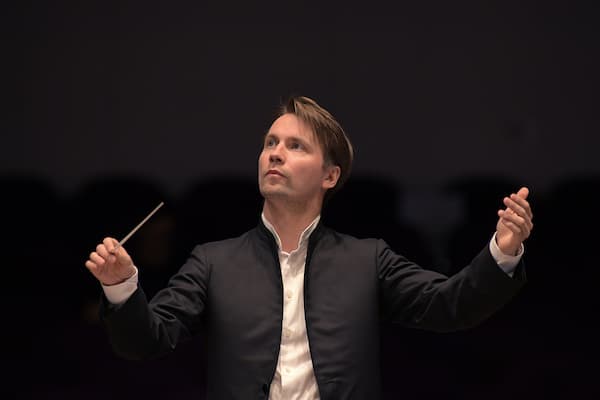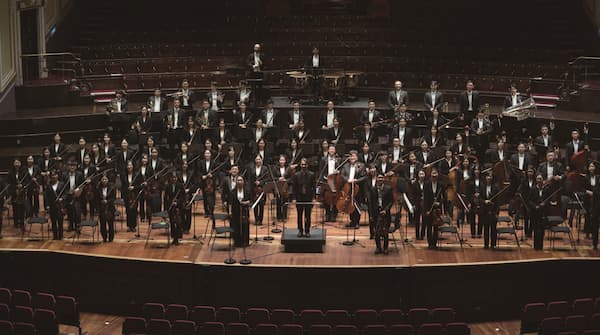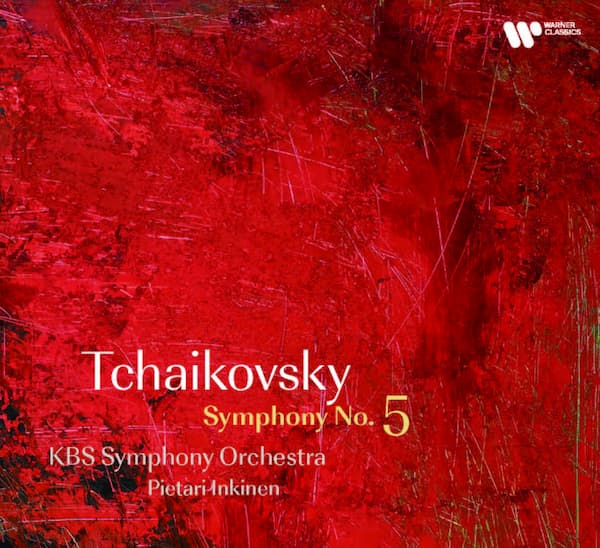Finnish conductor Pietari Inkinen was appointed music director of the KBSSO (Korean Broadcasting System Symphony Orchestra) in 2022 and, in the past 2 years, has been looking at their repertoire and building on their knowledge. One of their previous chief conductors had been Dmitry Kitayenko (1999–2004) who brought his deep knowledge of the Russian repertoire to the orchestra. Inkinen built on that through his recent recording of Tchaikovsky’s Fifth Symphony (Warner Records, 2024).

Pietari Inkinen (Photo by Andrea Zihler)
Inkinen’s career started at the Sibelius Academy’s Junior School conducting classes with Jorma Panula. Panula’s belief that conductors should start early to get familiar with the repertoire has led to Finland’s production of so many conductors of note who have come through his classes, including Esa-Pekka Salonen, Mikko Franck, Sakari Oramo, Jukka-Pekka Saraste, Osmo Vänskä, Klaus Mäkelä. Tarmo Peltokoski and Pietari Inkinen. This early opportunity to, as Inkinen says, ‘tell people 2 or 3 times your age’ what to do is unparalleled training. Inkinen also studied violin and combined that with his conducting, sometimes playing a concerto in the first half of a concert and conducting in the second half.
For such a young conductor, two remarkable opportunities stand out. The first was stepping in to lead Opera Australia’s complete Ring Cycle in November 2013 after the departure of Richard Mills in June 2013. Luckily for Australia, Inkinen had been in training. He had started to conduct the cycle with the first two operas in Palermo at the Teatro Massimo and completed Das Rheingold and Die Walküre in early 2013. Funding problems led to the cancellation of Siegfried and Götterdämmerung, and the whole cast and crew were disappointed. However, by mid-2013, Opera Australia was in desperate need of a conductor immediately and Inkinen was prepared to step forward. He said it was one of the simplest transitions he’s ever done – no rescheduling was necessary, he just changed countries and continued with Wagner.
This led to his conducting the cycle in the place they were created for in Bayreuth. His 2023 Ring led to universal acclaim, with one critic calling him ‘one of the most inspired conductors who ever undertook the Ring in Bayreuth…’. Inkinen spoke of the timeless appeal of Wagner’s story, where each new generation has the opportunity to make it modern. Opera Australia’s cycle, directed by Neil Armfield, had showgirl Rhine maidens, and Siegfried’s ‘forest cave’ was more like a shabby bedsit. Bayreuth’s 2023 production, directed by Valentin Schwarz, on the other hand, was compared to a combination of a TV reality show with a dysfunctional family drama…but it wasn’t boring.
Inkinen’s first appointment came in 2007 when he was named music director of the New Zealand Symphony Orchestra, which lasted through 2015. In 2007, he was named principal guest conductor of the Japan Philharmonic Orchestra, followed by being made chief conductor in 2015. That tenure ended in 2023. In January 2022, he was named both chief conductor and music director of the KBSSO.
We spoke about the repertoire of the orchestra, and he said that, as a broadcasting orchestra, they had many standing commitments to radio and television performances. They have large concert halls to fill, and the desire on the part of both the orchestra and their audience is for the classics. They don’t want premieres and new works – they want the familiar. When asked what he could do in this situation, he said that he wanted to broaden the repertoire. Have they performed all the Mahler symphonies? Mahler 7th had been skipped, so he programmed it. He bought his local premieres of Sibelius, as a composer dear to heart but not yet part of the local classical repertoire. Despite this new Tchaikovsky recording, he doesn’t see that more recordings will be important to the orchestra. Their performances are available via their broadcasts, and a recording simply duplicates something that’s already available.
His orchestra, with the exception of 2 American percussionists, is wholly Korean, which he thinks is an important part of the definition of the orchestra. Looking forward, he notes with alarm the falling Korean birth rate. Couples are more likely to have small, cherished pets rather than expensive little children.

KBS Symphony Orchestra (Credit: KBSSO)
In his travels leading different national orchestras (outside the Asia-Pacific region, he has been chief conductor of the Prague Symphony Orchestra (from 2014) and the Deutsche Radio Philharmonie Saarbrücken Kaiserslautern (from 2017), he seeks to help each orchestra find the language of each composer. Shostakovich shouldn’t sound like Brahms (although orchestras often present him that way). The Alpine Symphony should reflect the rapid changes of the Alps. As the conductor, he helps the orchestras find their way through new expressions while still being true to themselves and the composers. If he does make a recording, it’s to document what an orchestra does best.
Hear his Tchaikovsky Five, which moves through the emotions from despair to triumph. The dark first movement, with its ‘fate’ clarinet line, is changed in the second movement by its beautiful horn solo. The waltz of the third movement is peaceful until the clarinet returns with its fate theme. The doubts and despairs of the earlier movements are resolved by the triumphant final movement. It may start in the minor, but ends in pure victory.

Tchaikovsky: Symphony No. 5
KBS Symphony Orchestra, Pietari Inkinen, cond.
Warner Classics 8809355979786
Release date: March 2024
For more of the best in classical music, sign up for our E-Newsletter




